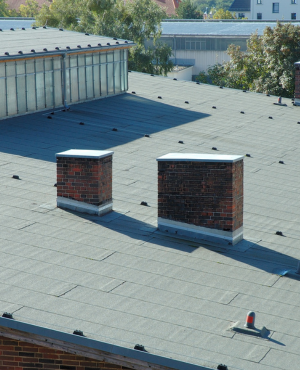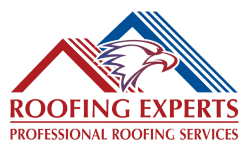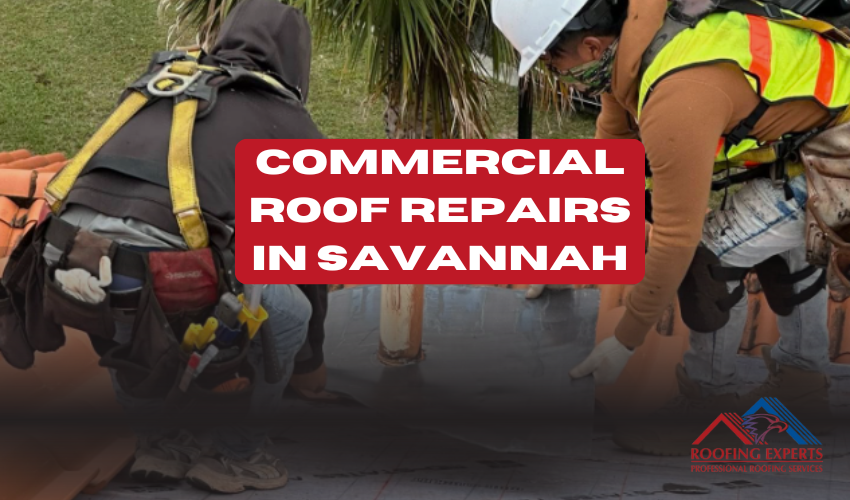Are you looking for commercial roof repairs in Savannah? If you are a property manager or business owner in Savannah who needs a roof repair for your commercial property, then we have you covered (literally).
When a commercial roof leaks, everyone feels it. Operations slow down, tenants complain, and repair costs climb quickly. Savannah buildings face year-round moisture and heat that accelerate wear, especially on flat and low-slope roofs.
Staying ahead of repairs isn’t just good property care. It’s protection against downtime. Here’s what property managers and business owners should know in Savannah about commercial roofing services!
6 Most Common Commercial Roof Problems We See in Savannah

Here at Roofing Experts of Savannah, we have helped install and repair 1,000’s of roofs in the greater Savannah/Chatham area. One issue we commonly see is commercial roof leaks with flat roofs!
Commercial roofs in Savannah are exposed to a formidable combination of heat, humidity, coastal air, and sudden heavy rain on top of the fact they are generally very large! These conditions stress flat and low-slope roofing systems faster than most building owners expect. The problems below are the ones we see over and over, especially on older roofs or roofs without a consistent maintenance plan.
1. Ponding Water on Flat Roofs
Flat roofs are designed to drain, not hold water. But when drains clog or the roof begins to settle in places, water can sit for days after a storm.
This standing water gradually softens the roofing membrane and encourages algae and mold growth. Over time, the weight of ponding water can also increase stress on the structure.
What makes this more common here:
- Heavy afternoon downpours overwhelm drainage points.
- Humid air slows evaporation, so water lingers longer.
- Slight settling in older buildings creates low spots.
If water is still present 48 hours after rain, the roof needs attention.
2. Loose or Failing Seams on TPO / PVC / Modified Bitumen
Most commercial roofs depend on seams where roofing sheets or rolls meet. These seams are sealed with heat, adhesives, or asphalt layers.
Savannah’s heat cycles cause expansion during the day and contraction at night. Over the years, that movement loosens seams and allows water to enter below the membrane.
Early signs:
- Rippling along seams
- “Tented” or lifted edges
- Small damp spots inside the building, directly below seam locations
3. Cracked or Aged Roof Coatings
Reflective coatings help protect commercial roofs from UV damage and keep energy costs manageable. But coatings don’t last forever.
As they age, they lose flexibility and begin to crack — especially in Savannah’s relentless summer sun. Cracks allow water to reach the membrane below, which can lead to leaks, bubbling, or surface breakdown.
Common triggers:
- Intense UV exposure
- Seasonal temperature swings
- Coating applied too thin during the previous application
4. Flashing Separation Around Walls, Vents, and HVAC Units
Flashing is the material that seals the joints where the roof meets vertical surfaces like walls, vent stacks, chimneys, or rooftop HVAC equipment.
These are the most common leak points on a commercial roof because they move differently than the roof surface during expansion and contraction cycles.
Why this happens:
- Hot rooftop air causes faster material flex
- High humidity degrades sealants more quickly
- Maintenance workers walking near units can accidentally stress seams
5. Drain and Gutter System Clogs
Commercial drainage systems do a lot of work in Savannah. Pollen, leaves, pine needles, and storm debris get pulled toward drains and gutters quickly. If those areas clog, water has nowhere to go, leading straight back to ponding and roof leaks.
Signs to look for:
- Water is moving slowly off the roof during storms
- Sediment or plant material around drain openings
- Overflow along the roof edges
Regular debris clearing is one of the simplest and most effective preventative maintenance tasks.
6. Punctures from Foot Traffic or Storm Debris
Commercial roofs often serve as access points for HVAC technicians, electricians, cable installers, and general maintenance crews. That foot traffic can compress or puncture the membrane, especially when tools or equipment are dropped. Meanwhile, coastal storms can blow branches, roofing nails, or construction debris across flat surfaces.
Why this matters:
- Even a small puncture can let water travel sideways for long distances under the membrane.
- Leaks often show up far from the actual entry point, making them tricky to diagnose.
Protective walk pads and controlled access help avoid this type of damage.
Early Warning Signs Your Commercial Roof Needs Repair
Most property managers and building owners ask if there are signs that they need a roof repair. Sometimes the answer is yes – a leak is very evident. However, sometimes the signs are not as obvious and might take a little more poking around and inspecting to see.
Below is a clear table showing the most common early warning signs, what they mean, and why prompt repair matters:
| Warning Sign | What You’ll Notice | What It Really Means | Why Repair Now Matters |
|---|---|---|---|
| Ponding water after rain | Water still sitting on the roof 24 to 48 hours later | Drains may be clogged or the roof has developed low spots | Prevents membrane breakdown and structural stress from standing water |
| Ceiling discoloration or staining | Yellow or brown marks on ceiling tiles or drywall | Moisture is migrating through the roofing layers | Stops water before it spreads into insulation, wiring, or interior finishes |
| Bubbling or blistering in roof membrane | Surface looks swollen, spongy, or raised in spots | Trapped moisture or air beneath the membrane | Repairs now stop full membrane separation later |
| Visible seam lifting or loose flashing | Edges of roofing rolls or flashing pulling upward | Expansion and contraction have weakened the seal | Prevents water intrusion at the building’s most vulnerable locations |
| Musty odor in upper floors or tenant spaces | Damp smell, especially after rain | Moisture is entering interior cavities or insulation | Avoids mold remediation and tenant disruption |
| Slow drainage at roof scuppers or internal drains | Water moves sluggishly or backs up when it rains | Debris buildup is restricting flow | Keeps water from forcing its way under membranes |
| Granule loss or coating wear | Surface of roof looks faded, chalky, or bare | UV exposure is degrading protective layers | Extends the life of the system before full recoating is needed |
| Deterioration around rooftop HVAC or vent bases | Cracking sealant or dark water rings around units | Movement and foot traffic are stressing the membrane | Stops recurring leaks around mechanical equipment |
| Interior temperature inconsistency | Rooms below roof feel hotter or more humid | Insulation or vapor barriers are being affected by moisture | Saves HVAC costs and protects insulation performance |
Repair vs. Replacement: Making the Smart Call

The key is understanding whether the roof still has usable service life or whether the problems you’re seeing are signs of structural decline. In commercial roofing, timing is what protects your budget. Repair too early, and you overspend. Repair too late, and you pay for damage that could have been avoided.
Start with these questions:
1. How old is the roof, realistically?
Not the number on paper, but the number based on Savannah conditions. Heat, sunlight, and humidity shorten lifespan. A roof rated for 25 years may perform like a 15–18-year roof here. If the roof is still within its healthy service range, repairs are usually the smarter move.
2. Is the damage isolated or widespread?
One leak near an HVAC curb is a repair. Seams loosening across the entire field of the roof suggest material fatigue. When failure shows up in patterns, replacement or a restoration coating system is more cost-effective.
3. Is water getting into the building envelope or just the surface layers?
Surface issues are cheap to fix. Once moisture reaches insulation or decking, the price and urgency increase. If repairs are only addressing symptoms and not the cause, the roof may be near the end of its life.
4. What is the business impact of disruption?
Commercial roofs must be evaluated in terms of downtime. A repair plan that stops leaks fast and schedules deeper work around operations prevents disruption and protects tenant relationships. Replacement should be strategic, not reactive.
Simple way to think of it:
- Repair when the roof is structurally sound and problems are contained.
- Restore (recoat) when you want to extend lifespan without full tear-off.
- Replace when the membrane is failing in multiple areas or moisture is inside the building systems.
Best Roofing Systems for Commercial Buildings in Savannah

What are the most common roofing systems installed on commercial buildings? Most flat roofs use TPO, and other roofing materials include metal and asphalt shingles. Here are the other most common roofing materials for commerical buildings:
TPO Roofing (Reliable, Reflective, and Cost-Efficient)
TPO is the most common commercial roofing material today because it reflects heat well and is relatively simple to maintain. It’s a strong fit for buildings where energy efficiency matters.
Why it works in Savannah:
- Reflective surface reduces rooftop heat gain
- Strong seam welds when installed properly
- Performs well against humidity and UV exposure
Best for: Warehouses, retail buildings, and large low-slope roofs.
Modified Bitumen (Durable, Layered, and Repair-Friendly)
Modified bitumen is known for toughness. It holds up under foot traffic and temperature swings and can be spot-repaired easily.
Why it performs well here:
- Multi-layer system tolerates heat cycling
- Puncture-resistant when workers access HVAC units
- Repairs blend seamlessly into the existing roof
Best for: Buildings with frequent rooftop maintenance or older roof decks.
EPDM Roofing (Flexible and Stable Over Large Surfaces)
EPDM is a synthetic rubber roofing membrane. It handles expansion and contraction well, which is valuable in climates with intense sun and daily temperature shifts.
Why it’s useful in Savannah:
- Flexible material reduces stress around seams
- Works well for vast, uninterrupted roof spans
Best for: Industrial facilities and distribution centers.
Commercial Metal Roofing (Strong, Long-Life, Coastal-Capable)
Metal roofs are highly resistant to wind uplift and can outperform membrane roofs when properly installed. They also shed water quickly, which prevents ponding.
Why it stands out here:
- High wind performance during coastal storms
- Longevity even with salt exposure when coated correctly
- Strong perimeter and edge integrity
Best for: Buildings needing long service life and minimal interruptions.
Roof Coatings (Extend Life Without a Tear-Off)
Coatings can be applied to many existing roofs to restore reflectivity, seal minor cracks, and prevent UV wear.
Why they matter in Savannah: The sun is relentless here. A coating stops the membrane beneath from aging faster than it should.
Best for: Roofs that are structurally sound but showing early signs of wear.
The Final Word on Commercial Roof Repairs
I will never forget the time I was at a local gym when, after heavy storms, the roof started leaking. Most of the patrons at this Savannah gym were complaining…
70% of business disruptions happen because a small maintenance issue was ignored for too long. A commercial roof leak isn’t just a facility problem. It affects your insurance rates, your repair budget, and how people perceive the reliability of your operation. Partnering with a commercial roofing contractor who understands coastal Georgia climates ensures your building stays open, dry, and dependable.
Let’s take care of your roof before it becomes the problem everyone notices.
- Savannah Roofing Experts specialize in roofing, including metal, asphalt shingles, and commercial roofing.
- We can help with roof repairs and roof leak fixes.
- Recgonized as one of the best roofing companies in Savannah.



Comments are closed